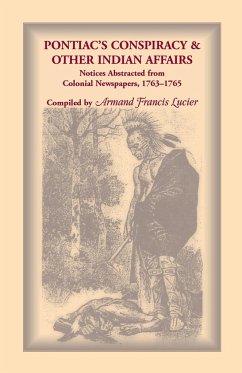The French & Indian War ended in victory for the English, and the French were forced to cede all of their forts, settlements and land-holdings east of the Mississippi River, save for New Orleans. This change of hands was followed by a flood of new English settlers eager to take advantage of fresh farm land and hunting grounds. The Indian tribes inhabiting these lands found themselves displaced by the new settlers, who, unlike the French before them, were unwilling to share the land. Pontiac, sachem of the Ottawa, resolved to resist the incursion and in doing so united all the Indian nations who had been in the French interest against the English. Known as Pontiac's Conspiracy, this bloody Indian uprising overran and captured nine frontier forts in fifteen days and nearly usurped English control in the Ohio Valley. This collection of Colonial newspaper abstracts allows the reader to experience the drama and uncertainty of Pontiac's Conspiracy just as it was experienced by the Colonials who lived through it. These articles offer eye-witness accounts of soldiers and civilians massacred, houses and fortifications burned and English settlers fleeing east with only the clothes on their backs. Readers may ponder the enormous amount of preparation needed, and the myriad hazards encountered by troops dispatched on military expeditions into the frontier. The events described here occurred nearly a century before the practical application of the telegraph, and belated newspaper articles such as these were the only means by which the public could be kept informed of the depredations and disasters taking place all along the Ohio. It is easy to imagine the eagerness of Easterners awaiting their weekly papers and the latest news from the West, after skimming even a few pages of this text. This is the sixth volume of abstracts compiled by Armand F. Lucier describing Indian affairs in Colonial America. Like the previous five volumes, it includes a full-name index.








